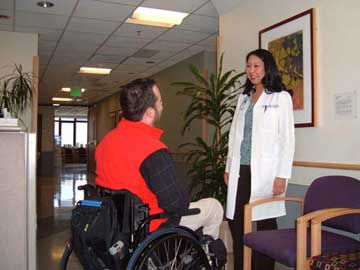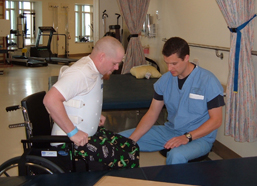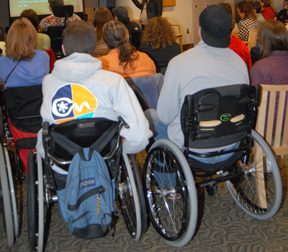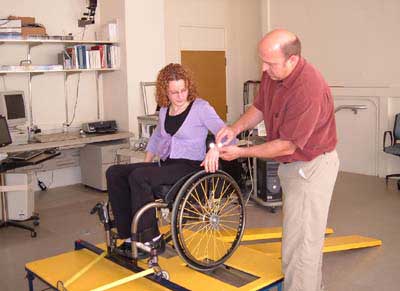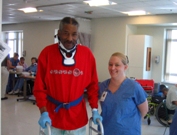SCI Pamphlets: Staying Healthy after a Spinal Cord Injury
The pamphlet series:
• Taking Care of Pressure Sores
• Maintaining Healthy Skin (Part I)
• Maintaining Healthy Skin (Part II)
• Taking Care of Your Bowels: The Basics
• Taking Care of Your Bowels: Ensuring Success
Depression and Spinal Cord Injury
[Download this pamphlet: “Depression and Spinal Cord Injury” (PDF - 477KB)]
Depression is a common illness that can affect anyone. About 1 in 20 Americans (over 11 million people) get depressed every year. Depression is even more common in the spinal cord injury ( SCI ) population-about 1 in 5 people. Estimated rates of depression among people with SCI range from 11% to 37%.
What is depression?
Depression is not just "feeling blue" or "down in the dumps." It is a serious medical disorder (just like diabetes, high blood pressure, or heart disease are medical disorders) that affects your thoughts, feelings, physical health and behaviors. Depression can cause some or all of the following physical and psychological symptoms:
- Changes in sleep
- Feeling down or hopeless
- Loss of interest or pleasure in activities
- Changes in appetite
- Diminished energy or activity
- Difficulty concentrating or making d ecisions
- Feelings of worthlessness or self-blame
- Thoughts of death or suicide
Although periods of sadness are normal after SCI , depression as we define it above is not, especially when the symptoms go on for more than a week or two. Depression is not your fault. It is not caused by personal weakness, laziness, or lack of will power.
Causes of depression
Although we don't know for sure what causes depression, we do know that life stresses and medical problems can cause a change in certain brain chemicals, called neurotransmitters. This chemical imbalance is linked to changes in mood, enjoyment, sleep, energy, appetite and ability to concentrate.
Depression can and should be treated
The good news is that the symptoms of depression can almost always be treated with antidepressant medications or specific types of counseling, or both.
It is important to treat depression because it can have such a harmful effect on a person's ability to function in day-to-day life. Depression can make pain worse, make sleep difficult, sap your energy, take away your enjoyment and make it difficult for you to take good care of your health. Untreated depression can last as long as 6 to 12 months, or more. Thoughts of death are common in depression and the risk of suicide is higher while someone is depressed.
Depression is treatable . Medications and psychotherapy have been shown to reduce the symptoms of depression and help people return to normal functioning.
How do antidepressants work?
Antidepressant medications seem to work by restoring a normal balance of important brain chemicals. This new balance leads to feeling better both emotionally and physically.
Treating depression can also help you function better at home and at work. Antidepressants are not addictive and have few side effects.
What about counseling?
Counseling or psychotherapy is often misunderstood. There are many different kinds of therapy, but one type that has been proven to help depression is called "cognitive-behavioral therapy." Cognitive-behavioral therapy is based on the idea that depression improves when people are more engaged in meaningful activities and when they regain their positive beliefs and attitudes about themselves, their world and their future. The therapist helps you find or resume activities that are meaningful or enjoyable to you. There will be barriers to overcome so the therapist supports you like a coach to help resolve the problems you face. The therapist also helps you recognize how your thinking becomes more negative in depression and how, through experimentation and logic, you can improve your outlook and build confidence.
What you can do
- Take a "depression self-test" like the one below.
- Answer all the questions honestly, add up your score and see where your score falls.
- If your score is 10 or higher and you have been feeling this way for more than a week or two, contact your health care provider or a psychologist, psychiatrist, or counselor who has experience treating depression.
- If you are having thoughts of death or suicide, contact your health care provider or a mental health specialist immediately. Also, inform those around you about how badly you are feeling so that they can support you and help keep you safe while you go through this difficult period.
If you have serious thoughts of suicide , call 911 or a crisis line. The crisis line in King County, Washington is 206-461-3222 . The national toll free crisis line number is 1-866-427-4747 .
Remember, depression is time-limited and treatable.
Depression Self-Test
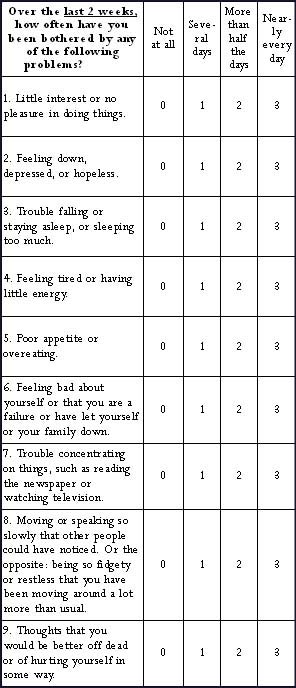
* Developed by Drs. Robert L. Spitzer, Janet B.W. Williams, Kurt Kroenke and colleagues, with an educational grant from Pfizer Inc.
University of Washington-operated SCI Clinics:
Harborview Medical Center
Rehabilitation Medicine Clinic
325 9th Ave., Seattle WA 98104
Spinal Cord Injury Clinic nurses: 206-744-5862
University of Washington Medical Center
Rehabilitation Medicine Clinic
1959 NE Pacific, Seattle WA 98195
Spinal Cord Injury Clinic nurses: 206-598-4295

